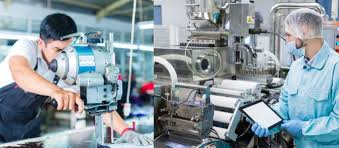The Art and Science of Production
Production is the cornerstone of any manufacturing process, where raw materials are transformed into finished goods through a series of systematic steps. It involves a delicate balance of artistry and precision, creativity and efficiency.
At its core, production is about bringing ideas to life. Whether it’s crafting a piece of furniture, assembling a complex machine, or creating a work of art, production is where imagination meets reality. It requires careful planning, skilled labor, and the right tools and technologies to ensure that the end product meets quality standards.
Efficient production processes are essential for businesses to meet customer demands, stay competitive in the market, and drive growth. From mass production in factories to custom-made products in artisan workshops, each approach has its own challenges and rewards.
Technology plays a crucial role in modern production methods. Automation, robotics, 3D printing, and other cutting-edge technologies have revolutionized the way goods are manufactured. These advancements not only increase productivity but also improve accuracy and consistency in production.
Quality control is another critical aspect of production. Inspecting raw materials, monitoring processes, and testing finished products ensure that quality standards are met at every stage. Continuous improvement initiatives help companies refine their production processes and deliver better products to consumers.
In conclusion, production is a dynamic blend of creativity and efficiency that drives innovation and economic growth. By embracing new technologies, optimizing processes, and focusing on quality control, businesses can enhance their production capabilities and deliver exceptional products to meet the needs of today’s consumers.
5 Essential Tips for Streamlining Your Production Process
- Plan and organize your production process to maximize efficiency.
- Implement quality control measures to ensure high standards are met.
- Regularly maintain and calibrate equipment to prevent breakdowns and delays.
- Train and empower your team members to enhance productivity and morale.
- Stay updated on industry trends and technologies to remain competitive.
Plan and organize your production process to maximize efficiency.
To maximize efficiency in production, it is crucial to meticulously plan and organize the entire production process. By establishing a clear roadmap from start to finish, including setting objectives, allocating resources effectively, and scheduling tasks efficiently, companies can streamline operations and minimize waste. Planning ahead allows for better coordination among team members, reduces downtime, and ensures that each step in the production workflow is optimized for maximum productivity. Ultimately, a well-organized production process not only enhances efficiency but also contributes to overall cost savings and improved quality control.
Implement quality control measures to ensure high standards are met.
Implementing quality control measures is essential in production to uphold high standards and meet customer expectations. By monitoring processes, inspecting raw materials, and testing finished products, companies can identify and rectify any deviations from quality requirements. This proactive approach not only helps in delivering consistent and reliable products but also builds trust with customers. Quality control measures serve as a cornerstone for continuous improvement, ensuring that production processes are refined, and the end products meet or exceed industry standards.
Regularly maintain and calibrate equipment to prevent breakdowns and delays.
Regularly maintaining and calibrating equipment is a crucial tip in production to prevent breakdowns and delays. By conducting routine maintenance checks and ensuring that equipment is properly calibrated, businesses can minimize the risk of unexpected malfunctions that could disrupt the production process. Proactive maintenance not only helps in avoiding costly downtime but also ensures that machinery operates at peak efficiency, leading to consistent output quality and improved overall productivity. Prioritizing equipment maintenance and calibration is a strategic investment that can help businesses maintain a smooth and uninterrupted production flow.
Train and empower your team members to enhance productivity and morale.
Training and empowering team members is a key tip for enhancing productivity and boosting morale in production settings. By providing employees with the necessary skills, knowledge, and resources, they are better equipped to perform their roles effectively and efficiently. Empowering team members by delegating responsibilities and encouraging decision-making not only increases productivity but also fosters a sense of ownership and motivation within the workforce. Investing in training and empowerment demonstrates a commitment to employee development, leading to a more engaged and satisfied team that can contribute positively to the overall success of the production process.
Stay updated on industry trends and technologies to remain competitive.
To stay competitive in the ever-evolving landscape of production, it is crucial to stay updated on industry trends and emerging technologies. By keeping abreast of the latest developments, companies can adapt their processes, optimize efficiency, and deliver innovative products that meet the changing demands of the market. Embracing new technologies not only enhances productivity but also positions businesses as industry leaders, driving growth and success in a dynamic and competitive environment.

No Responses